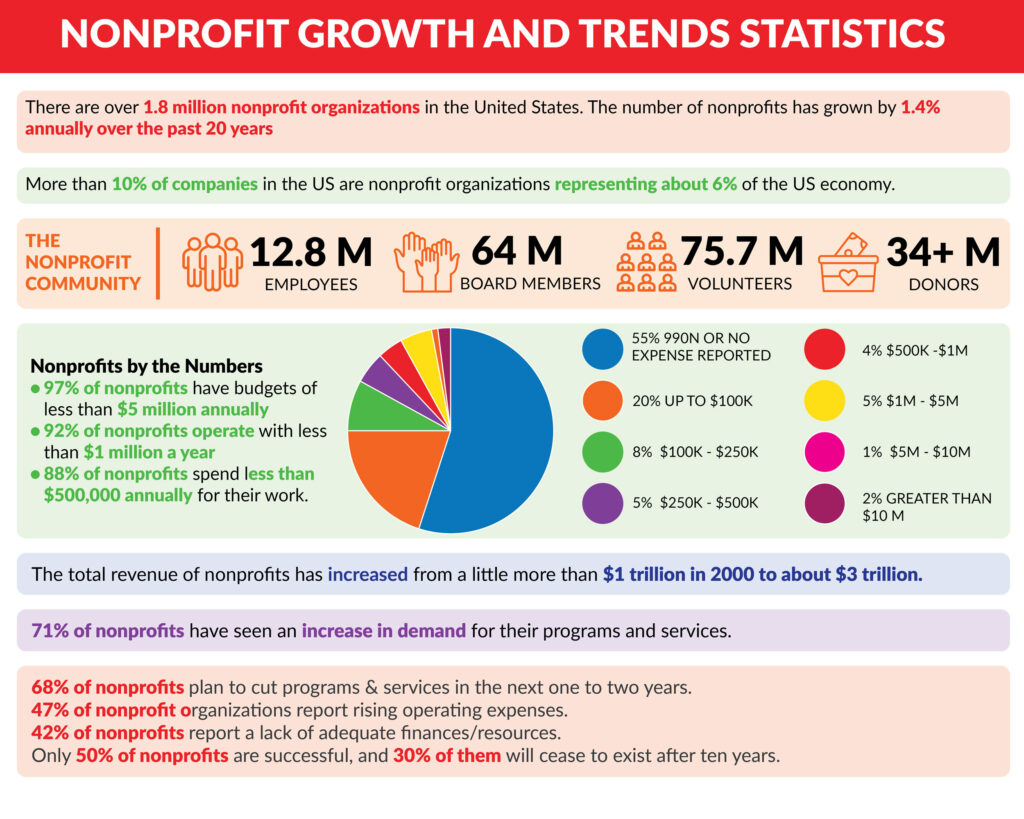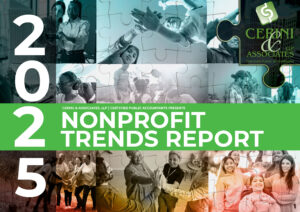2025 is anticipated to be an interesting year for the nonprofit sector. From a service delivery perspective, the significant inflation we have experienced over the last 3 years (between 16 and 20%) has put more individuals and families at risk. While inflation levels in the United States are anticipated to stabilize at between 2% and 2.5% during 2025, the demand for services will remain high during 2025, putting continued strain on an already stretched nonprofit sector. Government funding is anticipated to decline as NY State is looking at potential budget shortfalls over the next 3 years of $1 billion, $6.2 billion, and $7.1 billion, respectively. In addition, government payment slow-downs experienced over the last few years are not anticipated to get better any time soon.
As we all know, 2024 saw a change in the president, with the Trump administration stepping in for its second go-around in 2025. The election was heated and continued the trend we have had over the last decade of divisiveness across the country. This creates a tremendous level of stress and mental health issues which will need to be addressed. In addition, the Trump administration will bring with it certain initiatives that will impact the nonprofit sector. Where they ultimately layout is uncertain, but if he follows through on his campaign policies expect increased issues surrounding the environment, immigration issues, and overall funding for the sector.
The stock market’s strong performance during 2024 and anticipated declines in interest rates bode well for 2025 charitable contributions, with expectations of increases in contributions of approximately 3.9% over 2024 levels. We have seen a shift in contributions over the last decade with less people contributing to nonprofits, but larger gifts coming from more wealthy Americans. As the gap between the haves and the have nots continues to widen, we expect that trend to continue into the foreseeable future. This coupled with the largest level of wealth transference this country has ever seen (it is anticipated that $11 to $12 trillion dollars will pass from the silent generation and baby boomers over the next 20+ years to nonprofits) means that nonprofits need to increase relationships with affluent donors and make sure you develop relationships with the next generation.
Unfortunately, competition for discretionary resources is also expected to rise in 2025, so nonprofits will need to step up their communication game with donors. This means better linkage of donor funds to program accomplishments and impact, a better understanding of why donors give to your organization with more targeted messaging, an increased use of videos which provide enhanced storytelling, and more creative fundraising campaigns that include more experience driven “events.” Nonprofits need to remember that fundraising is a process. People who volunteer for an organization are more likely to give. Less than 50% of donors give a second time to an organization, so you need to work at developing the relationship to give them a reason to stay engaged. Find ways to more effectively collaborate with your donors so there is mutual benefit. Without a social return on investment why should people give?
Interest rates are expected to drop during 2025, but not as much as originally hoped. The Fed lending rate is anticipated to finish 2025 at around 4%, only about a ¼% drop from current rates. This will both keep 30-year mortgage rates in the 6.3/6.4 range for the year and also slow down economic growth in 2025. As a result, unemployment rates are expected to be about 3.9% at the end of 2025 verse about 4.2% (approximately 4.4% in New York State) at the end of 2024. Unemployment rates for black workers increased to 6.4% at the end of 2024, more than 50% higher than the national average. This continues to be an issue. With overall unemployment considered to be on the low end, this will continue to make it harder for nonprofit organizations to attract and retain staff. The minimum wage for NY City, Long Island, and Westchester increased to $16.50 ($15.50 for the rest of the State) per hour effective January 1, 2025. However, for many nonprofits looking for direct service providers, rates have already creeped up to $20 per hour or more. Nonprofits are going to have to look towards more flexible work environments or work schedules, increased or unique benefits (daycare, mental health, education), and clear and defined growth plans for staff.
With the projected increase in demand for services and the difficulty in bringing in staff, nonprofits will need to be diligent in finding ways to streamline operations. One way nonprofits can do this is by embracing technology. Finding ways to more effectively integrate various software applications, utilize AI to handle repetitive and time-consuming tasks, maximize the use of cloud computing, and utilize a CRM system to centralize data automatically. And while technology can be a tremendous resource for the sector, it can also add a tremendous level of risk, as cyber crimes are on the rise. Per a report from the Nonprofit Tech for Good, approximately 27% of nonprofits worldwide have been subject to cyber attacks. Nonprofits are particularly vulnerable to cyberattacks due to sensitive donor and patient information, limited cybersecurity expertise, outdated security protocols, lack of personnel and resources, and dependence on volunteers and third-party vendors.
The New Year’s Resolutions for 2025 for nonprofit organizations is:
- Invest in leadership and talent management. Succession of Board members and staff need to be part of the on-going process as does management training.
- Be more strategic in their thought process. Take the time during 2025 to focus on strategic planning.
- Find ways to enhance collaboration at all levels, with donors, funders, government, and other nonprofit organizations. This will help to enhance organization’s ability to provide enhanced services and develop more meaningful relationships.
- Focus on ways to increase financial sustainability through enhanced discretionary funding, social enterprises, and diversification of funding streams.
- Increase the use of technology and innovation to streamline operations and provide advancement for existing employees.

Kenneth R. Cerini, CPA, CFP, FABFA
Managing Partner
Ken is the Managing Partner of Cerini & Associates, LLP and is the executive responsible for the administration of our not-for-profit and educational provider practice groups. In addition to his extensive audit experience, Ken has been directly involved in providing consulting services for nonprofits and educational facilities of all sizes throughout New York State in such areas as cost reporting, financial analysis, Medicaid compliance, government audit representation, rate maximization, board training, budgeting and forecasting, and more.






No comment yet, add your voice below!